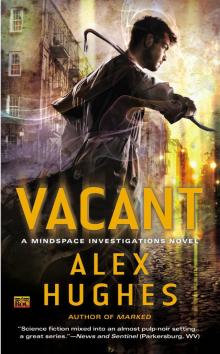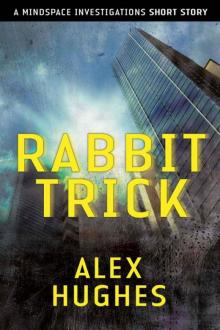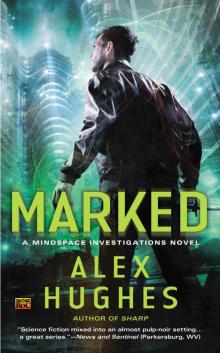- Home
- Alex Hughes
Marked Page 16
Marked Read online
Page 16
“That’s . . . disturbing,” I said.
“It’s a new world,” she replied. Then: “If you’re worried about madness contagion, I’d go by the screening machine before you leave. You don’t have to, but it’s there as much for your peace of mind as it is for the health of the Guild as a whole.” Her idea, she put in mentally. A real answer did a lot to address the panic and prevent the more susceptible minds from “catching” the illness. She’d have the students do it too, when they got out of testing.
I didn’t know how I felt about that. But it would probably work, at least for me. “Thanks. I’ll go by there,” I said. “If it stops me worrying, a little pain is worth it.”
Changing the subject, I asked her some more questions about the politics going on with the upcoming election, and she answered at length.
Finally she said, “It’s a blessing that so much of the senior staff and Council is away at the health care conference. At least for now the politicizing has died down. You can’t walk down the hall anymore without getting a student projecting some party line.”
“Didn’t they rule mind-to-mind advertisement disallowed?” I asked.
“Not in the last five years, and they’ve got students earning money that way. I feel for the students, but I’d like a little peace and quiet. At least, what little they’ll give me.” She sighed. “Like I said, the Guild isn’t what it was.”
“Change happens,” I said, one of her sayings.
She laughed. “I suppose it does. It sure isn’t like it was back in your day!”
From there the conversation turned to the old days, to when I’d first been one of her students, and then a professor. We talked for maybe an hour, and for that hour, I forgot I was in the middle of strangers with agendas. I forgot I was years away, and worlds apart. I forgot I didn’t belong, not anymore.
And I remembered, finally, what Jamie had been saying for so many years about living by example, about doing the right thing because it was the right thing.
As I walked out, I realized I hadn’t told Paulsen or Cherabino about the Guild. I’d been avoiding it, for no other reason than that I didn’t want to tell them. The old me wouldn’t have liked that. The old me would be in her office, trying to live by example.
So I decided to take the bus to the department and hope Paulsen was still working overtime. I needed to tell her, and I needed to tell her before I chickened out.
So I left, dropping by the scanning machine at the door as Jamie had suggested. I passed the test, and even the pain of it didn’t detract from the knowledge that I wasn’t mad. Maybe there was something to that after all.
CHAPTER 13
Paulsen held up a finger. One ear was cradled against a phone at her shoulder, her hand was scribbling notes, and the other hand held that finger up before returning to the phone. “No, I understand, sir. It’s a difficult budget situation for everyone. If I could get your support for a two percent . . . Absolutely, no, that’s not what I’m saying.” She paused. “Two percent is— Don’t interrupt me. Two percent is . . .” She listened, nearly huffing, for a long moment. “Fine. You have a nice day too.” She hung up the phone with a little more force than strictly necessary. “Asshole.”
She looked up and waved me in. “Close the door, please. What are you doing here so late on a Saturday? Your hours were cut.”
I closed the door and walked in a step or two. “I’m not filing for overtime. I have a bit of a situation.”
“If you don’t get a license, there’s not much I can—”
“That’s not it,” I said. “Can I sit down?”
She took a breath. “Yes, go ahead.”
Her office, normally messy, looked like a hurricane of paper had run to shore against her desk. Drifts of colored paper notes littered the floors in front of the walls, as more notes stood three deep on the walls themselves. She even had a small pile of files sitting on the guest chair, something normally too sacred to touch.
“Can I move these?” I asked.
She sighed, got up, and took the files out of my hands, placing them on top of a leaning tower of law books next to her desk. “You’re over your hours this week already, for the third week in a row. I know you work with Cherabino, but she’s salaried, and you’re not.” She straightened and held up a hand. “Even if you don’t ask for reimbursement, it’s a problem. If we get audited—which looks likely if I get this two percent increase we’re asking for—someone will go through and compare hours worked and paid, and a discrepancy on either side could land us in legal trouble. You need to go home when I tell you, Adam.”
I sat, gently. “Well, in that case I have good news for you.”
“Do you, now?” She sat as well, leaning a little forward.
“I need to take the next two days off, maybe a third.”
She sat back. “Well, that would seem to solve our hours problem neatly. I’ve got most of the part-timers in this week, so the rooms will get covered. Still, you left without warning last week. What’s the reason you need to be out?”
“Here’s where it becomes a situation.” I took a breath. Yes, I was really going to do this.
“I’m listening.”
“Remember Kara? Tall blonde, wears suits? She’s come here a couple of times as the Guild’s liaison. She’s helped solve a number of cases for us.”
“You realize you introduce her every single time she comes up? Where is this going?”
“Her uncle recently died, and she thinks it was a murder.”
Paulsen got very, very still. “We don’t have jurisdiction on Guild personnel. Koshna is very clear.”
“You don’t,” I said. “The law is considerably fuzzier if they invite an ex-Guild consultant in for opinions.”
She didn’t say anything for a moment, then put forth very carefully: “It sounds to me like a conflict of interest.”
Paulsen was so very, very still. Her mind was trying desperately to withhold judgment until full information was had, but the Guild was potentially the most dangerous enemy her department could have—whether the Guild meant to be or not. Normals didn’t like the Guild, didn’t trust the Guild, and having the appearance of being in bed with said Guild could shut down her job and the jobs of most of the department. Neutral was the only thing here that could work. Strictly, strictly neutral.
She met my eyes. “I’m giving you an opportunity here to explain to me why it’s not a conflict of interest.”
Other than the fact that Kara’s word might have a beneficial effect on my PI appeal? “She’s my ex-fiancée,” I said. “And she’s asked for my help. Confidentially? Her uncle is one of the leaders of the Guild. They want a neutral investigator. It’s important to them that I’m unaffiliated in this context. If we take that to its logical conclusion, the department can play the same card. It’s very important to you guys that I am also unaffiliated. We saw in the Bradley case that my contacts at the Guild could play very useful to the department.”
“And in the Hamilton case your ties to the Guild cost a good man his life,” she returned. Her mind was still open, decision unmade, but she was squirrelly about this, and about trusting me. Her worst fear was me doing something stupid behind her back again.
“You’re talking about Bellury,” I said. “Bellury and my last fall off the wagon.” It hurt, because she was right. I pulled back into myself a little. “Bellury was my fault, for being stupid.” I hadn’t called for backup when I should have done so. It would haunt me—well, it wouldn’t let me go, and that was, as Cherabino put it, as it should be. It should hurt. It should. “But,” I said, “it’s important to note that you were investigating Emily Hamilton’s death as a normal murder, not a Guild case. Her connections to the Guild were even more recent than mine. I’m not saying that what happened was anyone’s fault but mine, but I am saying that the Guild’s politics is affecting cases wit
h normals. You still need someone who can bridge that gap. Someone neutral. And I’ve passed every drug test you’ve put in front of me. That shouldn’t be an issue, not anymore.”
She settled back in her chair, her mind going hard and calculating and a little sad. “Neutrality will have a heavy price tag for you,” she said. “I can’t put you in the interview rooms as a department representative if you don’t represent the interests of the department.”
I hadn’t expected this. I felt like I stood at the edge of a cliff. A big, wide, deep cliff, where one step would take me over the edge.
But I owed the Guild a debt for Swartz’s life. And Kara had come through for me many, many times, and Meyers had been a good guy. “You’ve said yourself it’s very likely that my job will be cut because of politics on this side anyway. And nobody’s to say you can’t continue to employ a neutral third party for casework and suspects you need insight into. You call in Piccanonni for profiling. She’s not with the department.”
“Piccanonni is Georgia Bureau of Investigation, statewide law enforcement. It’s not the same thing. I’d caution you, Adam, to think this through all the way. You’d go from likely to lose your job to almost a guaranteed loss. You may get hired back part-time as basically an assistant to Bransen’s team. If—and only if—Bransen decides you’re worth the political fallout. Either way you’re out of the interview room and out of my department.”
“You’re saying if I help Kara out you’ll fire me?” I asked carefully. The cliff was right there. Right. There! “They’re not exactly asking nicely. There have been threats.”
She sighed, looking more tired than I’d ever seen her. “I’m sorry. I really am. You need to make your best choices, but as far as this department goes, I don’t have any other choice but protecting our interests. We can work out details on finishing up whatever case you’re working with Cherabino—you deserve that much, at least—but barring a miracle I think there’s no other way this can go. Is this really what you want, Adam?”
I considered lying to her. She didn’t monitor the interview rooms much anymore, and Clark and the others for good or ill were more than used to me bailing on my usual schedule for the sake of one case or the other. Usually I came back and took all of their interviews for cases later, so they went home early, but not always. I could tell Cherabino I was in the interview room; if she was really working as many cases as all that, she wouldn’t have time to think about it. Everyone else would assume I was working a case with her. I might very well get away with time away with a few good lies.
But Swartz—Swartz said you had to face up to your decisions like a man. You had to stand up and do something, and deal with what you’d done honestly. Lying about your actions was the mark of a child.
So then, the question became, was this thing for the Guild worth my job? Threats or no, was it worth my job?
“Adam?” Paulsen prompted.
“I need the next two days off, possibly a third,” I heard myself saying. “You do what you need to do when I get back.”
Her face fell in genuine disappointment. “Clear out your desk and locker tonight. I’ll have an officer escort you off-site.”
“That’s it?” Really? How could that be it?
“I’m sorry, Adam. You’ve made your choice.” She picked up a stack of folders from the floor and opened the first one. “See yourself out.”
I felt like she’d slapped me. “You said I could work with Cherabino . . . ?”
She looked up. Her face was like stone now. “We’re done, Adam. You need to talk to Bransen now.”
She looked back down at her notes and picked up her pen, a clear dismissal.
I pulled my heart out of my boots, streaming pain, and limped out of the door. I staggered down the hall and stopped, leaning against the wall dumbly until some cop asked what was going on. He had to say it three times before it registered.
“What?” I said, my bereft tone leaking pain like the rest of me.
“I’ve been assigned to escort you to clean out your things and clear the building,” he said. A big guy, with a scar on his neck almost covered by a geometric black-and-white tattoo.
I blinked, and made myself actually be present. Actually care, though it seemed painful and pointless. I knew this guy; he was one of the special tactics bruisers who’d invaded the warehouse in the Bradley case. Though I couldn’t remember his name for the life of me. He’d been nice to me back then. He looked stern now.
“Where are we going first?” he asked.
His contempt made me angry, oddly, and I stood up. “The locker room. I have a bag there that should hold everything else. Then the cubicle upstairs. I hope you’re prepared to wait. I’m taking everything.” I swallowed, then tossed out the ultimatum: “And you’re driving me home when we’re done.”
He wasn’t happy with that one. I didn’t care.
• • •
The cruiser dropped me off in the front of my apartment building, my breath visible in the light of the streetlight above. The building was a faded former office block converted to apartments—and converted badly—in the aftermath of the Tech Wars. It had a few surprises left in the walls, surprises I’d used to my advantage, but it was, essentially, a dump. Or at least it seemed now, with my world in free fall.
For all of the lower-income families that lived here and my single neighbors, there was no drug problem in this building. I’d looked, more than once, in the early days. The lack made part of me happy, very happy; I’d have to make the trek out all the way to Fulton County to ruin my sobriety. That part had turned in anyone who’d ever sold to me in DeKalb, which was why they wouldn’t sell to me anymore. But the rest, the suspicious and cynical pack rat that still wanted the drug, that still wanted to fall off the world and get high, that part was sitting up today.
It had been a while since we saw each other last, and I waved hello tiredly as I climbed up the long flights of stairs to my apartment, every step a triumph. I was paying attention, enough attention to see if anyone was waiting for me in my apartment again, but not much else.
The rest of me was working out how to get to South Fulton, or maybe East Ponce de Leon Street, and take my chances on the yuppie blocks not far from the public housing. It was pretty late, though, and my telepathy was better but not a hundred percent at this hour. I couldn’t rely on changing the seller’s mind to see that I was okay and not a cop. I might get shot. And the buses to Fulton County could very well stop running by the time I got down there and leave me stranded.
I argued with myself, back and forth, back and forth, but it was an old, well-worn argument and one already won. I had to be down at the Guild building at eight tomorrow morning, which meant I had to leave at six thirty.
And more important, I’d have to be in the midst of countless telepaths all day. Once I’d been a liar, mind-to-mind, when I’d had to be. Once I’d kept secrets from the brethren, and largely succeeded. I was not that guy anymore, and my telepathy was not that reliable anymore. I couldn’t rely on hiding anything.
So the decision was simple: if I had any chance at all at showing up and doing what I’d promised, of not ruining all of my credibility within the first half hour, I couldn’t use tonight. I’d just told Paulsen, the best boss I’d ever had, to jump off the cliff so I could show up and actually have a chance at being the good guy for once. What was the damn point if I couldn’t follow through?
So I unlocked my door—after checking the mat was empty—and let myself in. The same empty room awaited me, a barely there kitchen with an antique microwave taking up most of the counter space. A ratty old couch and coffee table. The infinitesimal bathroom through the door on the back wall, and the depressingly empty bedroom through the door on the back right. The grand total of my kingly castle, currently dirtier than I’d meant it to get.
I made myself a cup of rehydrated dehydrated soup, continu
ed the worn argument in my head for another hour, more out of habit than anything else, and then went back to the bedroom to lie down.
As the machine turned on, canceling out my brain waves, I pretended it canceled out the argument too. I dreamed of pack rats clawing me, and I woke up tired and far too early.
I got breakfast, scrubbed the apartment more for something to do than anything else.
Regret rode me for not falling off the wagon last night, but the decision had been clear, and regret was an old friend. He didn’t scare me anymore.
• • •
The phone at my apartment rang with a piercing shriek just before I left the door. I sighed and went back for it.
“Hello? Who is this?”
“Hi, this is Rachel Muñez,” a woman’s voice said crisply. “Is this Adam Ward?”
“Yes,” I said, and sat down on my cot. “What is it?” Rachel had been one of the department accountants handling my money for years; she wasn’t warm, but she wasn’t cold either. The numbers were just the numbers to her.
“I realize it’s Sunday, but we’ve got audits all week and I wanted to make sure that I talked to you. It’s going to be the weekend before I finish up the paperwork and get the final books update done. Honestly, maybe next week. These political guys are driving me nuts. Anyway, I don’t want to hold up your accounts. If you’re willing to work with the paperwork I have right now, I can transfer ownership this morning. You’ll have one more paycheck coming, but we can—”
“Hold on. What?” I asked. I felt like I was tracking every-thing. It was still pretty darn early.
“I’m sorry. Was I unclear?” her voice asked, very tired. “Which part?”
“You’re transferring which accounts?” I asked.
A pause came over the phone. “Um, I was told you were leaving the department.”
I swallowed. “Well, yes. Paulsen’s department anyway.”
“Do you anticipate other arrangements?” Rachel asked. “I’m not trying to push you into anything. But with your relationship with the department ending, the money relationship does as well. You have a right to your accounts if you want them.”

 Rabbit Trick: A Mindspace Investigations Short Story
Rabbit Trick: A Mindspace Investigations Short Story Clean: A Mindspace Investigations Novel
Clean: A Mindspace Investigations Novel Vacant
Vacant Sharp: A Mindspace Investigations Novel
Sharp: A Mindspace Investigations Novel Payoff
Payoff Rabbit Trick: A Mindspace Investigations Novella
Rabbit Trick: A Mindspace Investigations Novella Marked
Marked Sharp
Sharp